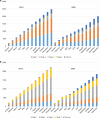Impact of the SARS-CoV-2 pandemic on female breast, colorectal and non-small cell lung cancer incidence, stage and healthcare pathway to diagnosis during 2020 in Wales, UK, using a national cancer clinical record system
- PMID: 35501391
- PMCID: PMC9060409
- DOI: 10.1038/s41416-022-01830-6
Impact of the SARS-CoV-2 pandemic on female breast, colorectal and non-small cell lung cancer incidence, stage and healthcare pathway to diagnosis during 2020 in Wales, UK, using a national cancer clinical record system
Abstract
Background: COVID-19 pandemic responses impacted behaviour and health services. We estimated the impact on incidence, stage and healthcare pathway to diagnosis for female breast, colorectal and non-small cell lung cancers at population level in Wales.
Methods: Cancer e-record and hospital admission data linkage identified adult cases, stage and healthcare pathway to diagnosis (population ~2.5 million). Using multivariate Poisson regressions, we compared 2019 and 2020 counts and estimated incidence rate ratios (IRR).
Results: Cases decreased 15.2% (n = -1011) overall. Female breast annual IRR was 0.81 (95% CI: 0.76-0.86, p < 0.001), colorectal 0.80 (95% CI: 0.79-0.81, p < 0.001) and non-small cell lung 0.91 (95% CI: 0.90-0.92, p < 0.001). Decreases were largest in 50-69 year olds for female breast and 80+ year olds for all cancers. Stage I female breast cancer declined 41.6%, but unknown stage increased 55.8%. Colorectal stages I-IV declined (range 26.6-29.9%), while unknown stage increased 803.6%. Colorectal Q2-2020 GP-urgent suspected cancer diagnoses decreased 50.0%, and 53.9% for non-small cell lung cancer. Annual screen-detected female breast and colorectal cancers fell 47.8% and 13.3%, respectively. Non-smal -cell lung cancer emergency presentation diagnoses increased 9.5% (Q2-2020) and 16.3% (Q3-2020).
Conclusion: Significantly fewer cases of three common cancers were diagnosed in 2020. Detrimental impacts on outcomes varied between cancers. Ongoing surveillance with health service optimisation will be needed to mitigate impacts.
© 2022. The Author(s), under exclusive licence to Springer Nature Limited.
Conflict of interest statement
ML has received an unrestricted educational grant from Pfizer for research unrelated to this work. ML has received honoraria from Pfizer, EMF Serono, Roche, Bayer, Novartis and Carnall Farrar unrelated to this work. DWH has received research consultancy fees from Pfizer for research unrelated to this work, and his department (Welsh Cancer Intelligence and Surveillance Unit, Public Health Wales) has received analysis partnership funding from Macmillan Cancer Support for unrelated work. The remaining authors declare no competing interests.
Figures





References
-
- Welsh government. Coronavirus and the law. https://gov.wales/coronavirus-law. 2021. Accessed 12 July 2021.
-
- Cardiff University. COVID Health and Help-seeking Behaviour Study (CABS). https://cabs-study.yolasite.com. 2021. Accessed 12 July 2021.
-
- Welsh government. COVID-19 Hospital Discharge Service Requirements. 2021. https://gov.wales/hospital-discharge-service-requirements-covid-19 Accessed 12 July 2021.
-
- Welsh government. Maintaining Health Services During the Covid-19 Pandemic. https://gov.wales/sites/default/files/publications/2020-05/maintaining-e.... 2021. Accessed 12 July 2021.
Publication types
MeSH terms
Grants and funding
LinkOut - more resources
Full Text Sources
Medical
Miscellaneous

